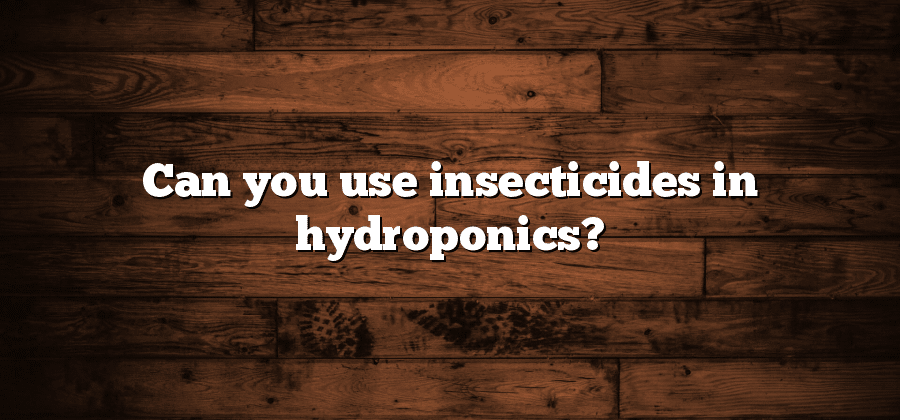Understanding Hydroponics and Pest Control
Hydroponics, a method of growing plants without the use of soil, has gained popularity due to its efficiency and ability to produce high yields. However, just like traditional gardening methods, hydroponic systems are susceptible to pest infestations. Understanding pest control in hydroponics is crucial to ensure the health and productivity of the plants.
Pests in hydroponic systems can range from common insects like aphids and whiteflies to more complex organisms like nematodes and fungal pathogens. These pests can stunt plant growth, reduce yield, and even lead to crop failure if left unchecked. Identifying the risks associated with insect infestations is necessary to implement appropriate pest management strategies.
Common Pests in Hydroponic Systems
One of the challenges that hydroponic growers face is dealing with pests that can wreak havoc on their systems. These pests can be detrimental to the overall health and productivity of the plants, as well as the longevity of the entire hydroponic setup. Therefore, it is crucial for growers to have a good understanding of the common pests that can infest their hydroponic systems.
One common pest in hydroponic systems is aphids. These tiny insects have soft bodies and can reproduce quickly, leading to significant damage to the plants within a short period of time. Aphids feed by piercing the plant’s tissue and sucking out the sap, causing the leaves to curl and distort. Another common pest is spider mites, which are tiny arachnids that can multiply rapidly in hydroponic environments. They feed on the plants’ sap and leave behind tiny webs, causing yellowing and drying of the leaves. It is important for hydroponic growers to be able to identify these pests early on to take appropriate measures for their control.
Identifying the Risks of Insect Infestations
Hydroponic systems offer numerous benefits for indoor gardening, including increased plant growth and reduced water consumption. However, just like any other type of gardening, hydroponic systems are also susceptible to insect infestations. Identifying the risks of these infestations is crucial in order to prevent significant damage to the plants and ensure the success of the hydroponic setup.
One of the primary risks of insect infestations in hydroponic systems is the potential for extensive damage to the plants. Insects such as aphids, spider mites, and whiteflies can feast on the tender leaves and stems, sucking out essential nutrients and weakening the overall health of the plants. This can result in stunted growth, leaf discoloration, and even the death of the plants if left untreated. Additionally, some pests can introduce harmful diseases to the hydroponic system, further compromising the plants’ ability to thrive. Therefore, early detection and timely intervention are crucial to prevent these risks from escalating into larger problems.
Evaluating the Effectiveness of Insecticides
When it comes to hydroponic systems, ensuring effective pest control is crucial for the success of your crop. Insect infestations can quickly take a toll on your plants, hampering their growth and productivity. In such situations, evaluating the effectiveness of insecticides becomes paramount.
To determine the efficacy of a particular insecticide, it is important to consider several factors. Firstly, one must assess the extent of the infestation and the specific pests affecting the crops. This will help in selecting the appropriate insecticide that targets the specific pests present in the hydroponic system. Additionally, it is vital to know the growth stage of the plants, as some insecticides may cause harm to young or sensitive plants. Furthermore, one must take into account the mode of action of the insecticide, as different types of pesticides have varying mechanisms to control pests. Finally, monitoring the efficacy of the chosen insecticide over time is essential to assess its overall effectiveness in controlling the infestation.
Types of Insecticides Suitable for Hydroponics
Hydroponic systems provide an efficient and controlled environment for growing plants without the use of soil. While this method offers numerous advantages, it is not immune to the challenges posed by pests. Insect infestations can quickly spread and wreak havoc on hydroponic crops if not managed effectively. Thankfully, there are several types of insecticides that are suitable for use in hydroponics, offering growers a range of options to combat these pesky critters.
One type of insecticide commonly used in hydroponics is the biopesticide. Derived from natural sources such as plants, animals, or microorganisms, biopesticides are known for their environmentally friendly nature. They target specific pests and are generally less harmful to beneficial insects, animals, and humans. Examples of biopesticides suitable for hydroponics include products based on Bacillus thuringiensis (Bt), which is effective against caterpillars, and neem oil, which has repellant and anti-feedant properties for a wide range of insects. These biopesticides offer growers an alternative to traditional chemical-based insecticides, providing an effective and sustainable pest control solution for hydroponic systems.






